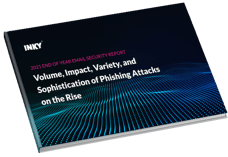The rise in ransomware attacks - especially those causing a ripple effect down to consumers - has put the spotlight on a number of issues surrounding the war on cybercrime. At the top of the list is cryptocurrency. In 2020, ransomware cybercriminals raked in more than $350 million worth of cryptocurrency, a 311% increase from the previous year.1
If you’re not too familiar with the world of cryptocurrency, you’re not alone. The first cryptocurrency only came to market in 2009. Here are a few facts to get you up to speed.
Bitcoins – The First Cryptocurrency
In its simplest form, Bitcoin is a form of cash for the Internet. Created in 2009 by someone using the alias of Satoshi Nakamoto, bitcoin was the first form of cryptocurrency. The name stems from cryptography, which is used to control the currency’s creation and transactions, instead of a regulated authority.2 While there are thousands of different cryptocurrencies in circulation, the most popular is bitcoin. Here are a few more facts you should know:2,3
- Bitcoins offer users a peer-to-peer payment network that has no central authority or middlemen, such as a bank or similar financial institution
- Bitcoins are purchased or sold on virtual marketplaces, called bitcoin exchanges, and they accept many types of currencies
- People can send bitcoins to each other using mobile apps or their computers
- Bitcoins are stored in a digital wallet that exists in the cloud or on a computer
- The names of bitcoin buyers and sellers are never revealed, and this anonymity is appealing for those involved in illicit activities
- Transactions are private and very difficult to trace back to those involved
- Unlike bank accounts, digital wallets and the money in them are not insured by the FDIC
- Today, bitcoins can be used to book hotels, purchase furniture, and more.
- Bitcoin payments are considered easier to make than a bank transaction because they don’t require a merchant account
- Anti-money laundering laws for cryptocurrency don’t exist yet, as they do in existing financial systems
Cryptocurrency’s Ties to Ransomware
According to the FBI, “Ransomware is a type of malicious software, or malware, that encrypts data on a computer making it unusable.”4 Once the ransomware has done its job, cybercriminals hold the company data hostage until a ransom is paid – most often in the form of bitcoin or similar cyber currency. If the ransom is not paid, the hacker can destroy the data or, if it contains sensitive or confidential information, release it to the public. So, how does the malicious software make its way to the company’s files and data? More often than not, it is the result of an email phishing attack.
Cryptocurrency = Hacker Heaven
It’s easy to see why cryptocurrencies are the payment method of choice for cybercriminals conducting ransomware attacks. In May of 2021, Colonial Pipeline paid nearly $5 million in a ransomware attack, in the form of untraceable cryptocurrency. Once the funds were received, the cybercriminals responsible shared a decrypting tool designed to restore the disabled computer network. Thankfully, the FBI stepped in and was able to recover the majority of the money. Of course, no ransomware recovery team can make up for the company’s lost time, resources, and credibility.
Prevention is Worth More Than Its Weight in Gold (Or Bitcoin)
The best way to prevent a costly ransomware attack is to keep it from happening in the first place. That means stopping phishing threats before they stop you. INKY is the industry leader in the fight against phishing—providing unprecedented levels of malware and ransomware protection. INKY scans every sent and delivered email automatically and flags malicious emails, protecting your organization and your clients from even the most complex threats. INKY’s intelligent machine learning algorithms identify abnormalities in emails, even if the threat has never been seen before. In addition, INKY’s Banner warns employees of threats, while protecting and training them at the same time.
When it comes to preventing costly phishing attacks, time is of the essence. Thankfully, INKY installation is simple. Most customers are up and running in under an hour – even with remote employees.
Thousands of companies are introduced to the world of cryptocurrency the hard way—by paying ransoms. Don’t let it happen to you. Schedule a demo or inquire today.
----------------------
INKY® is the most effective hero in the war against phishing. An award-winning cloud-based email security solution, INKY® prevents the most complex phishing threats from disrupting or even immobilizing your company’s day-to-day business operations. Using computer vision, artificial intelligence, and machine learning, INKY® is the smartest investment you can make in the security of your organization. INKY® is a proud winner of the NYCx Cybersecurity Moonshot Challenge and a finalist in the 2020 RSAC Innovation Sandbox Competition. Learn more about INKY® or request an online demonstration today.
1Source: https://blog.chainalysis.com/reports/2021-crypto-crime-report-intro-ransomware-scams-darknet-markets
2Source: https://money.cnn.com/infographic/technology/what-is-bitcoin/index.html
3Source: https://bitcoin.org/en/faq
4Source: https://www.ic3.gov/Media/PDF/AnnualReport/2020_IC3Report.pdf



